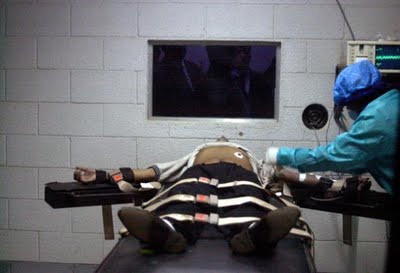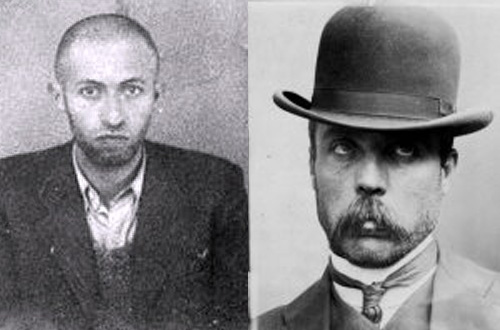
Here we go again!
I’ve already posted four previous articles wherein I brilliantly solve some of the world’s most complicated conundrums. Today, I will solve a problem that has plagued every democracy in the world for centuries: the question of capital punishment.

This is all a bit untoward, what?
Capital punishment has been employed since the advent of civilization. When someone commits a crime that marks them as a mortal threat to a community, the only options are complete forgiveness (dangerous), banishment (possible repercussions), imprisonment (costly) or execution (barbarous but effective). Execution became wildly popular because it served two sociological purposes: it rid the community of a mortal danger and it wreaked vengeance for those affected, be they community members or the State itself.
When the world emerged from the horrors of world war in the 20th century, many nations banned capital punishment. It was all too clear how dangerous it was to trust the State with the option of executing its own citizenry. The Western world was quick to ban it. Today in the West, only Belarus and the United States continue to enforce capital crimes. Much of Africa and Asia continue to employ it, including the otherwise pacific people of Japan.

Gosh, look how civilized we are!
I’ve read a few books on the subject, but I won’t bother recounting the moral aspects of the various methods of execution. Instead, I will forward a policy designed to bridge the gap between capital punishment supporters and critics.
To do this, I’ll address the aspects that trouble us:
1) That capital punishment deters others from committing capital crimes;
2) That capital punishment is a just vengeance for survivors of a capital murder;
3) That the State can’t be trusted to fairly enforce capital punishment;
4) That capital punishment is morally reprehensible.
In a nutshell, my plan is the following: remove the power to execute from the State and deliver it to the People as a civil matter. Sound crazy? Then let’s get on with the crazy!

Meet our murderers:
John Smith………………………………….Hank Jones
While every criminal case is different, for my purposes I wish to delineate first degree murder cases into two categories: those based on circumstantial evidence and those based on indisputable evidence. John Smith (not his real name) was arrested after his wife was found dead. Police found forensic evidence at the crime scene and on his person that linked him to the crime. Hank Jones (not his real name) was in a public place and, in front of dozens of witnesses, shot to death three people in an effort to murder a man who he mistakenly believed had cheated him of $60.
Right now, lawyers are already angry with me, as “every case has its details and merits” and “you can’t just categorize so broadly”. But yea, I think I can. So stay with me for a bit.
Let’s assume both men were found mentally fit to stand trial for first degree murder. Both men were convicted of the charges. There are families that want to see these men dead. And there are attorneys who disagree on the particulars of these trials and harbor continued concerns about the convictions. People are calling for The Chair. Others are calling for clemency. What to do? Here’s what I think.
My primary concern is the same of all the other Western democracies: the State cannot be trusted to enforce capital punishment fairly. Liberals, Conservatives and Libertarians should all agree on this point. Hell, we don’t feel the State fairly enforces parking regulations, much less the decision to execute its own citizens! We all know that prosecutors are tasked to convict every clown that shows up in the dock to the furthest extent of the law. They build careers on this. They are not obliged to be merciful. And they have been historically unconcerned about having prosecuted innocent people. Shit happens, right?
Well, when your zeal leads to an innocent man being executed, you have crossed a line that most civilized nations find unacceptable.
So, since the State cannot be trusted to fairly enforce the power of executing its own citizenry, we are left looking at the other side of the coin. Does society have a vested interest in seeing a convicted murderer executed?

We can take care of this ourselves, right pardner?
I would faithfully submit that every competent study on capital punishment (in America) shows a negligible effect as a deterrent. That just isn’t how murderers think. If it’s not a crime of passion, it’s a crime of single-minded cruelty and vengeance. Pro’s and con’s aren’t being weighed. And that’s why we can’t afford to have these people running loose.
So, the deterrent argument is crap. That leaves us with the moral dimensions. Is it immoral? And should the survivors of a capital crime have the right to see their antagonist executed? Before you say “yes” and “no”, imagine this:
You’re an anti-capital punishment guy at a house party with your spouse, your two young daughters and seven friends. A guy bursts in with a gun and a bomb. He threatens to blow up the bomb if anybody moves. He proceeds to rape your daughters and forces you to watch. Then he shoots both girls to death as you watch. He has a big belly laugh and urinates on the corpses. He did it for fun, and he says you and your spouse are next. Just then, he is overpowered by the dinner guests. He is arrested, arraigned and convicted of two counts of first degree murder. In court, he leers at you and during conviction threatens to rape your spouse and kill both of you afterward. Your life is devastated. You can’t sleep. Your marriage crumbles. You think you are losing your mind. Through a confederate, this guy continues to send you death threats. He just won’t stop.
Do you now feel a need to have this guy executed? Maybe, maybe not. But the moral dimension has surely shifted. Life in prison without parole for this guy may not be enough for you.

Step 1: weight of the evidence.
Let’s look at my plan now.
To begin, I would remove from the State its ability to sentence anyone to death. Life without parole would be the toughest sentence possible. In most cases, and in most civilized countries, this is the end of it. The State is now charged with dealing with this person.
I must stress that according to American law, this person was convicted because they were found guilty “beyond a reasonable doubt”. Reasonable doubt has been a legal football kicked by attorneys for many decades across untold criminal cases, but it remains the Law of the Land. It is perhaps purposefully vague, yet we still observe it.
So, the State can find someone guilty beyond a reasonable doubt. However, that standard does not apply in civil cases. The preponderance of evidence is weighed by a civil judge, and that judge’s decision can be appealed. In most cases, the standards of evidence in civil trials is something less strict than “beyond a reasonable doubt”. It’s a weaker standard. Since execution is irrevocable, any legal standard to execute someone must go the other direction: it must have a substantially higher standard of evidence.

You are hereby remanded to a private execution service!
I would submit that in the case of first degree murder, any person who can show direct damage from the defendant’s actions can lobby a civil court to have that person executed, but with the following caveats:
1) The civil court must find that the evidence leading to conviction was not just “beyond a reasonable doubt”, but that the evidence reached a higher standard that I call “overwhelming and compelling”.
2) If this civil court finds the defendant was convicted with evidence that was “overwhelming and compelling”, the plaintiff can ask the court to remand the defendant to a private facility at the plaintiff’s cost.
3) The defendant can appeal the civil decision.
4) If the appeals fail, the defendant is remanded to a private institution and a fixed date of execution is set. This date cannot be delayed or forwarded.
5) At the private institution, the staff arrange for the defendant to be executed in a manner determined to be neither cruel nor unusual.
6) At the proscribed moment, the plaintiff performs the action that causes the execution to occur.
7) After the execution occurs, the defendant’s family or representatives reserve the right to sue for wrongful death should evidence arise that counters the “overwhelming and compelling” evidence that caused the civil execution case to move forward.
I think this recourse solves the many conflicting aspects of capital punishment. It removes the State from responsibility and places it firmly in the hands of the plaintiffs (the aggrieved party). It filters out defendants who were convicted with less-than-overwhelming evidence. It places a substantial personal and financial burden on the aggrieved party. It causes execution to become personal and extremely rare.
In my estimation, the vast majority of capital cases will be reduced to Life Without Parole. Only the Worst of the Worst will become truly capital cases. And even if a bloodthirsty plaintiff insists on pleading to a Civil Execution court, they remain on the hook for a potential counter-suit. Only the most passionate of the aggrieved will bother.
This will likely result in an effective abolition of capital punishment, but (importantly) it does not remove the concept from public consciousness. We can still consider ourselves to be tough on crime. Yet we will no longer be a nation that lets the State do our killing for us. That is a dangerous policy and my plan solves it.
So, unless you are willing to hound your murderer to the very end of the legal rope, and unless you are willing to do the killing by your own hand, you need to suck it up and accept Life Without Parole as the best possible outcome.
As for the private execution services? I’m sure Halliburton could come up with something.

